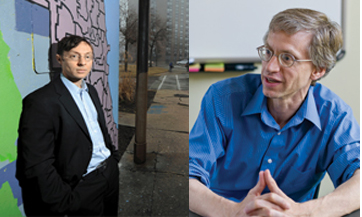| Sun | Mon | Tue | Wed | Thu | Fri | Sat |
|---|---|---|---|---|---|---|
| 1 | 2 | 3 | 4 | 5 | ||
| 6 | 7 | 8 | 9 | 10 | 11 | 12 |
| 13 | 14 | 15 | 16 | 17 | 18 | 19 |
| 20 | 21 | 22 | 23 | 24 | 25 | 26 |
| 27 | 28 | 29 | 30 | 31 |
CATEGORIES
RECENT ENTRIES
BLOG ROLL
Crime Lab's analysis? The court got it wrong.
U of C’s Crime Lab says the Supreme Court’s rejection of the Chicago handgun ban might make city violence more lethal.
The Supreme Court ruled Monday that Chicago’s 28-year handgun ban violates the Second Amendment. The decision didn’t surprise anyone—in 2008 the Court struck down a similar statute in Washington, DC. But Harold Pollack, the Helen Ross Professor at the School of Social Service Administration, sees the legal question as only part of the gun-violence dilemma. “I’m very sorry about the decision. There’s no doubt that the widespread proliferation of handguns is a huge public health problem,” Pollack says.
 Far from wrestling with the ambiguities of constitutional jargon, Crime Lab directors Jens Ludwig and Pollack judge public policy with hard numbers. They've used statistics to evaluate pilot programs aimed at reducing gun violence in Chicago and across the country. Ludwig and Pollack believe that systematic, randomized studies of crime-prevention techniques can yield results as reliable as those found in medical clinical trials.
Far from wrestling with the ambiguities of constitutional jargon, Crime Lab directors Jens Ludwig and Pollack judge public policy with hard numbers. They've used statistics to evaluate pilot programs aimed at reducing gun violence in Chicago and across the country. Ludwig and Pollack believe that systematic, randomized studies of crime-prevention techniques can yield results as reliable as those found in medical clinical trials.
While there’s little definitive data on the effectiveness of Chicago’s handgun ban, Ludwig argued in a 2008 NPR interview that the similar statute in DC may have made it harder for criminals to buy guns. Before the ban, Ludwig said, “If I’m selling a gun at a yard sale, unless somebody comes up with their Rikers Island alumni hat, I have no reason to know that they have a disqualifying record.” Imposing a ban, Ludwig said, makes these informal markets harder to come by, and in the process makes it harder for criminals to buy guns.
But the ruling will hardly send Chicago back to the days of Dillinger—already the city is busy planning to reduce the impact of the ban’s repeal. The court’s decision states that the Second Amendment protects gun ownership for self-defense in the home, leaving a lot of wiggle room for other forms of handgun regulation. Crime Lab Executive Director Roseanna Ander said in a Chicago Tribune article this week that, whatever options the city considers, allowing the proliferation of handguns will only lead to more violence. “It's putting gasoline on a fire," she said. "What we need is more water."
With or without the ban, Pollack says, the city needs to adopt other approaches to the issue. “You can have a great handgun ban in Chicago, but if you have your girlfriend drive a short distance and legally buy a handgun that makes it difficult...we can do a lot to deter people from using or carrying or brandishing the guns that they have.” If gun regulation can encourage citizens to leave handguns at home, Pollack argues that a lethal element in everyday confrontations can be eliminated. “I would much rather that person not have a gun, but if it’s at grandma’s house he won’t be pulling it out when there’s a fight on the basketball court,” he says.
Another U of C professor, economist Gary Becker, AM'53, PhD’55, argued in 2008 (in agreement with respected economist Chris Rock) that a tax of “several hundred percent of the untaxed price” should be applied to lawful gun purchases, making prices in both legal and illegal gun markets surge.
Pollack says his concern with the court's decision reflects a more fundamental question of values. “The ban," he says, "served a very important function in expressing a message that we think guns are a toxic presence in our society."
Burke Frank, '11
July 2, 2010
